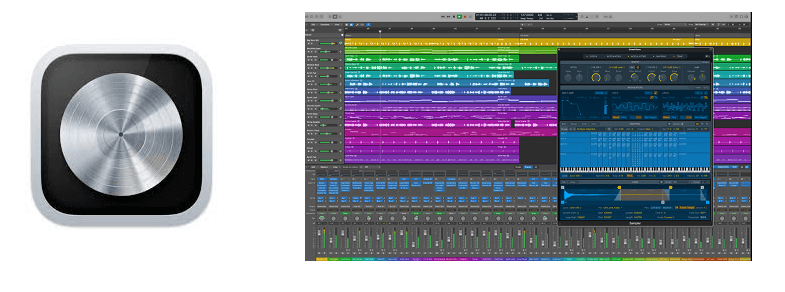About Ableton
As its name suggests, Ableton Live is the favourite DAW among live performers. With a simple and easy to use interface, and a hardware controller like Ableton Push, Ableton is truly a powerful DAW for music production. Ableton can run on both Windows and Apple devices. However, it can be slightly pricier and purchasing additional hardware is also not very easy on the pockets.
About Logic Pro
Logic Pro is Apple’s answer to Ableton. It is a great DAW and is highly flexible. It can run on any Apple device. The best part of Logic is that it can be controlled with any USB or MIDI controller. It is also quite affordable. It’s biggest drawback, however, is that it cannot run on non-Apple operating systems like Windows.
Different Ableton vs Logic
Ableton has been designed keeping live performers in mind. This is why the effects and plugins are always visible in the Arrangement view. You can also create MIDI loops on the fly in the Session’s view. Logic, on the other hand, is meant for recording studios. While you can also loop tracks with Logic, you will need to specify it. Therefore, it is not that live friendly.
Ableton Live vs. Logic Pro
1. Learning Curve
Learning a DAW can be tough for beginners. There are way too many options, menus and controls at your disposal. Beginners often find it difficult to understand where to begin. Thankfully, both Ableton and Logic have quick help options where you get a brief description of any element that you hover your mouse over. But many times, this might not be enough. Rather having an intuitive and user-friendly interface is what actually counts and Logic is the clear winner in this department. The module arrangement and layout is simple enough for beginners to grasp in a short span of time.
2. Interface/Workflow
In the case of Ableton, the MIDI samples, voices and effects are all found along the left pane. They are present right from the beginning in the default view. Logic, on the other hand, hides these functionalities by default. You will need to activate the view. The layout of both DAWs are not exactly the same. In Ableton, you can switch between the Sessions view and the Arrangement view. The Sessions view is mainly where the volume, pan and other levels of each track can be adjusted. The Arrangement view, on the other hand, is where the recorder tracks are displayed horizontally. In Logic, both these views are present together, where the tracks are displayed in the centre and the mixer or session’s view is present in the bottom pane. Ableton wins without a doubt in this category as it’s fluid and flexible interface is powerful enough for any application. It just needs some time getting used to.
3. Instruments/Effects
Both Ableton and Logic come packaged with VSTs and Instruments. Effects such as compression, delay and reverb are available for both DAWs. Ableton has 13 instruments while Logic has 21. But, the sample quality of Ableton’s instruments are much superior to Logic’s. Moreover, Logic’s instrument has not been updated much over the years. There are some instruments in Logic that sound pretty great though. While Logic’s instruments come packaged into the standard edition, you have to purchase the Suite edition of Ableton to get hold of all instruments. But, Ableton’s synthesizer wavetable is one of the best in business. It is highly intuitive, flexible and powerful.
4. DAW Functionality
Logic Pro has some great routing options that are very flexible and make it more suitable for mixdowns. Doing the same thing on Ableton needs a separate text file hack. Ableton is better for handling electronic music as it provides a plethora of ways to manipulate samples and sounds. Overall, Ableton has a smoother and faster workflow.
5. Audio Recording
Audio Recording functionality is needed mainly for studio applications. Ableton has a pretty simple and straightforward recording interface that is extremely fast and responsive. However, Logic’s interface provides a lot of features that are not available in Ableton. These features, like the Quick Swipe Comping, can be used to seamlessly modify tracks and mastering audio.
6. Live Performance
Ableton’s session view window is what makes it such a great tool for live performers. Live composition, live looping and Djing are all very simple to do with the sessions view. You are even able to apply effects easily during an ongoing performance. Logic is not suitable for live performances as these features are not available in it.
7. Price
Logic is much more pocket-friendly as compared to Ableton. It provides all its instruments, VSTs and plugins with its standard edition. Ableton requires a purchase of its suite edition to get all the instruments. It is not as pocket friendly.
Which is Better
If live performance and electronic music production is what you are looking for, then Ableton definitely takes the cake. It has all the technical features and a smooth layout and workflow for live looping and performances. DJs and performers simply love it. Logic is more of a singer-songwriter’s DAW. It is more of a studio recording software and has features like quick comping etc. that is more suitable for a studio environment. It is also more pocket-friendly. Comment * Name * Email * Website
Δ







![]()